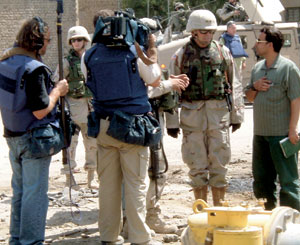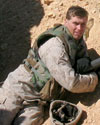

While this public tug-of-war was playing out, Chiarelli and other American and Iraqi leaders were privately preparing for election day. Many of their tactical decisions are still classified. However, Chiarelli was able to offer a few insights into the security operations. Normally commanding 22,000 troops, he had more than 37,000 soldiers under his authority on Jan. 30. If you count the members of the Iraqi National Guard, the total goes up to 42,000.
He scoffs at rumors that mechanics were pulled out of the motor pool and cooks off the kitchen line to swell the ranks of soldiers on patrol. "We made sure that every soldier we could find was trained to do the work. There were innovative ways to get people, but I'm not going to say any more because we may need to do the same thing again someday," he says.
Iraqis and Americans swept up about 2,500 suspected insurgents the month prior to the election, increasing the ranks of detainees to 8,000-the highest total since the invasion. Americans also stockpiled ammunition, food and fuel in the weeks before the vote so that there would be no need for convoys (a favorite insurgent target) on election day.

The Iraqi troops, many trained by the First Cavalry, took charge of security around the polling stations. The Americans reinforced those troops, running roadblocks and checkpoints throughout the city.
One tactic to foil suicide bombers was the overnight placement of road barriers. Streets that were normally arterials suddenly became dead-ends. With most traffic banned, Baghdad became a pedestrian zone for the day. "The barrier plan was meant to stop anyone with an VIED [vehicle-borne improvised explosive device] in a vehicle," Chiarelli explains.
The confusion worked, although there were still 106 attacks and nine suicide bombings. "The Iraqis were totally opposed to anyone taking away their right to vote," he says. "When they dipped their fingers in indelible ink, it was a sign of defiance."
Because any Iraqi who gets food ration coupons was automatically registered (and because almost all Iraqis take advantage of the program), care needs to be taken when looking at overall voter participation. Chiarelli says it was about 58 percent-higher than participation in the 2004 national election in the United States (55.3 percent) if you count all U.S. adults who are of voting age.
Watching Iraqis risk their lives to vote was transformative, he adds. "No American who was there will ever look at voting the same way."
He says that there is now a sense of hope for the future in Iraq. After watching the new parliament hold its first session, he says "the Iraqis are going to come up with what they feel is the best government." One sign of a turnaround: 40 Sunni clerics who urged their followers not to vote are now encouraging Sunnis to join the army and the police. "This is huge," he says.
Prior to the election, Iraqi media outlets refused to run announcements about a tip line for reporting suspected insurgents. After the election, he says, five newspapers began to run ads asking for the same information.
Attacks on coalition forces peaked at about 140 a day prior to the election. In April they were at 30-40 a day, although insurgents heightened attacks in May after the new Iraqi cabinet was formed.
 Ted Lester, '02, Corporal, 3rd Light Armored Reconnaissance Battalion, Marines; Time of service: August 2004-April 2005; Stationed: all over; Currently: Marine Corps Air Ground Combat Center, Twentynine Palms, Calif.
Ted Lester, '02, Corporal, 3rd Light Armored Reconnaissance Battalion, Marines; Time of service: August 2004-April 2005; Stationed: all over; Currently: Marine Corps Air Ground Combat Center, Twentynine Palms, Calif.
"Fallujah was the toughest by far. You couldn't trust anyone. You constantly had to watch your back. You'd think that if a woman and child were coming up to your checkpoint, it would be no problem. They're not as suspicious as a military-age male. But there are female suicide bombers, kids carrying grenades. Nobody could be trusted. And you really felt . a great sense of frustration. You really felt alone, even though you're with all these other guys. You're disconnected from the outside world, so you're wondering, 'Is this even worth it? Are we even making any progress?' It felt awesome, once it was over with. But at the same time, within 48 hours of returning to our base for the first time in a month, we were told, 'Now you're going to Ramadi. You're going to try to take down Ramadi too.' So there we were, back to how we felt at the beginning of Fallujah. 'Aw man, are we gonna make it through this one?' " Read more of Ted's story at: War Stories: Huskies in Iraq
Go To: Page 1 | Page 2 | Page 3
War Stories: Huskies in Iraq. On-going web exclusive about Huskies serving in Iraq.
Questions for the Vets. A web exclusive with questions to those serving in Iraq.
Loss and Recovery: UW Expert Aids Army Amputation Units